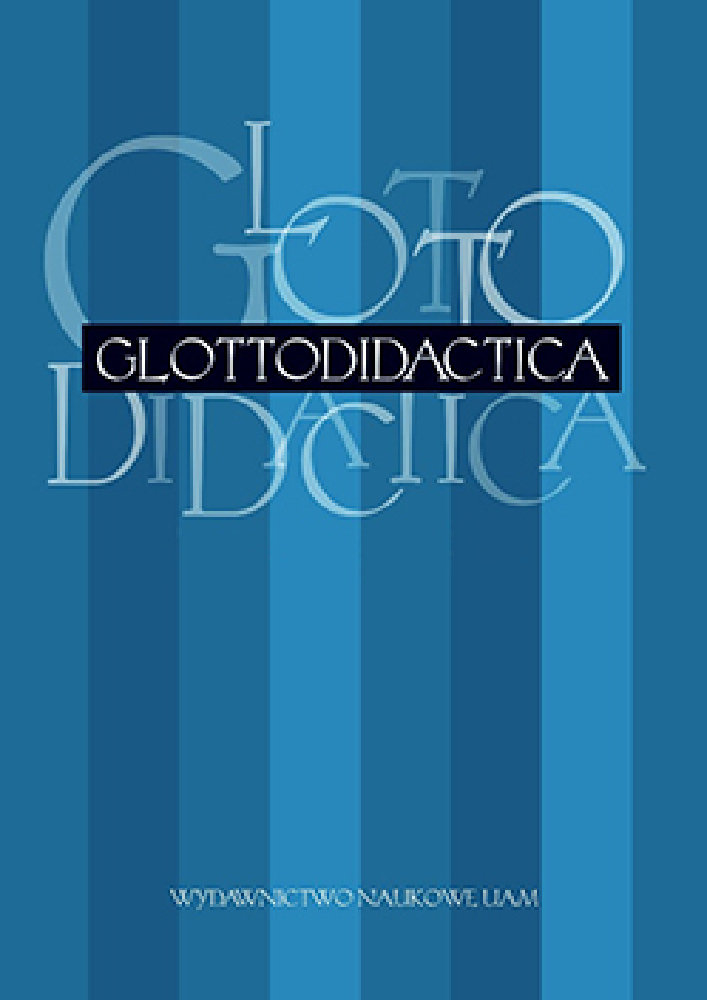Résumé
The aim of this paper is to show what sort of translation problems appear in the adjective-substantive collocations in Polish and German. A special class of collocations is represented by lexicalised and idiomatised syntagmas. These units include characteristic attributive perspectives specified by the two languages and the two culture communities. This phenomeneon refers to conventional valuing, attributions and métaphorisations of concepts represented in substantives used. In this way collocations form and fix the cultural profiles of reality. Because of that they can be regarded as cognitive formulas which need to be reprofiled in a concrete translation process through their projection on the target language and culture. As a result of these cognitive and linguistic operations the translator identifies the convergences and divergences as determined by the language system and the text between both the two languages. He secondly constructs equivalent attributive profile of the concept transferred into the target text, thus guaranteeing the reciprocity of perspectives between both of the texts. The essay classifies the cases and types of disparities between Polish and German adjeck-tive-substantive collocations, showing how they can be reprofiled according to linguistic and cultural requirements of the target text. This class of translation problems is only a subfield of the larger domain, but the main mechanism of the important translation transfer can be already demonstrated and exemplified basing on these specific translation units.Références
Bartmiński, J., 1993. O profilowaniu w słowniku etnolingwistycznym. In: Philologia slavica. K 70-letiju akademika N.I. Tolstogo. Moskwa, 12-19.
Czirko, L., 1989. Kookurretizanalyse der deutschen Gegenwartssprache. Studien zur deutschen Sprache. Bd. 16. Tübingen: G. Narr.
Czirko. L., 1997. Pronominale Attribute von Mann und Frau in der deutschen Schriftsprache. In: Sprachreport. Informationen und Meinungen zur deutschen Sprache. 12-14.
Dobrovolskij, A., 1998. Idiome im mentalen Lexikon. Ziele und Methoden der Phraseologie forschung. Trier: Wissenschaftlicher Verlag.
Gładysz, M., 1999. Lexikalische Kollokationen im Deutschen und Polnischen. Praca doktorska obroniona w Uniwersytecie Śląskim.
Gładysz, M., 1999. Didaktische Implikationen der Kollokationsforschung. In: M. Heinemann, E.
Kucharska, E. Tomiczek (eds.) Im Blickfeld: Didaktik des Deutschen als Fremdsprache. 2. deutsch-polnische Nachwuchskonferenz zur Giottodidaktik 14. - 17. Mai 1998 in Karpacz. Wrocław: WWO, 16-32.
Grzegorczykowa, R., 1998. Profilowanie a inne pojęcia opisujące hierarchiczną strukturę znaczenia. In: J. Bartmiński, R. Tokarski (eds.) Profilowanie w języku i w tekście. Lublin: Wydawnictwo UMCS, 9-19.
Klappenbach, R., Steinitz, W. (red.) 1980. Wörterbuch der deutschen Gegenwartssprache. Berlin: Akademie-Verlag.
Koniuszaniec, G., 1997. Kollokationen im Bereich der Tautonymie. In: Studia Germanica 23. 97-103.
Langacker, R., 1995. Wykłady z gramatyki kognitywnej - Kazimierz 1993. H. Kardela (red.). Lublin: Wydawnictwo UMCS.
Sommerfeldt, K.-E., Schreiber, H., 1974. Wörterbuch zur Valenz und Distribution deutscher Adjektive. Leipzig: VEB Bibliographisches Institut.
Wahrig, G., (red.) 1973. Großes Deutsches Wörterbuch. Rheda: Verlag für Wissen und Bildung.
Wilss, W., 1997. Adjektiv/Substantiv-Kollokationen. Ein Beitrag zum Verständnis von Textbausteinen. In: N. Grbić, M. Wolf (eds.) Text-Kultur-Kommunikation: Translation als Forschungsaufgabe; Festschrift aus Anlaß des 50jährigen Bestehens des Instituts für Übersetzer-und Dolmetscherausbildung an der Universität Graz. Tübingen: Stauffenburg-Verlag, 67-85.
Żmudzki, J., 1995. Konsekutivdolmetschen - Handlungstransfer und transferierende Handlung, In: F. Grucza (eńs.) Kwartalnik Neofilologiczny. Warszawa 1995, 55-71.
Żmudzki, J., 1997. Über einige Aspekte der Textualität in der Rezeptionsperspektive des Konsekutivdolmetschers. In: G. Antos, H. Tietz (eds.) Die Zukunft der Textlinguistik. Traditionen, Transformationen, Trends. Tübingen: Niemeyer-Verlag, 179-193.
Żmudzki, J., 1998. Konsekutivdolmetschen - Handlungen, Operationen, Strategien. Frankfurt/M, Berlin, Zürich, Wien, Paris, New York: Peter Lang Verlag.
Żmudzki, J., 1999. Zum Schweigen des Konsekutivdolmetschers. In: H. Eggert, J. Golec (eds.)... wortlos der Sprache mächtig. Stuttgart-Weimar: Verlag J.B. Metzler, (283-301).
Licence
Auteurs
Les auteurs de textes acceptés pour publication dans la revue Glottodidactica sont tenus de remplir, signer et renvoyer à l'adresse de la rédaction, un accord sur l'octroi d'une licence gratuite pour les œuvres, avec obligation d'accorder une sous-licence CC.
Conformément à cet accord, les auteurs des textes publiés dans la revue Glottodidactica accordent à l'Université Adam Mickiewicz de Poznań une licence non exclusive et gratuite et autorisent l'utilisation de la sous-licence Creative Commons Attribution-NoDerivatives 4.0 International (CC BY-ND 4.0).
Les auteurs se réservent le droit de disposer librement de l'œuvre.
Utilisateurs
Les utilisateurs d'Internet intéressés ont le droit d'utiliser les œuvres publiées dans la revue Glottodidactica depuis 2016, selon les conditions suivantes :
- Attribution – obligation de fournir, conjointement avec l'œuvre distribuée, des informations sur l'auteur, le titre, la source (lien vers l'œuvre originale, DOI) et la licence elle-même.
- Aucune modification – l'œuvre doit être préservée dans sa forme originale. Sans le consentement de l'auteur, il n'est pas possible de distribuer l'œuvre modifiée sous forme de traductions, publications, etc.
Les droits d'auteur sont réservés pour tous les textes publiés avant 2016.
Autres
L'Université Adam Mickiewicz de Poznań conserve les droits sur la revue dans son ensemble (mise en page, forme graphique, titre, conception de la couverture, logo, etc.).
A PARTIR DE L’ANNEE 2015, LES ARTICLES PUBLIÉS DANS LA REVUE SONT DISPONIBLES SOUS LICENCE CREATIVE COMMONS : https://creativecommons.org/licenses/by-nd/4.0/deed.fr




